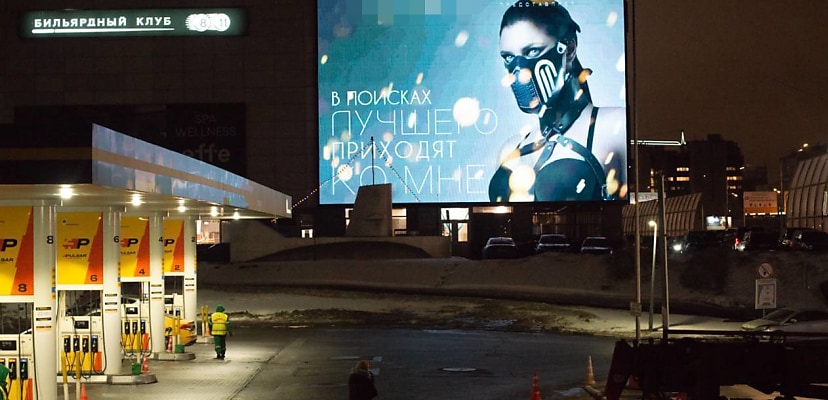Share this article on:
Powered by MOMENTUMMEDIA
Breaking news and updates daily.
Moscow residents witnessed a rare piece of advertising on a giant digital billboard over the weekend — a Russian darknet marketplace was spruiking its wares right out on the street.

The ad was for BlackSprut, a largely drug-focused market that mostly serves customers in CIS countries and elsewhere in eastern Europe. The ad featured an attractive woman in a cyberpunk-style mask and fetish wear, and the statement “Come to me if you’re looking for the best”.
According to darknet market tracker DarknetOne, BlackSprut has over 1,100 vendors and has been operating since May 2021.
The important question is how the advertisement made it onto the billboard in the first place. It could be a hacked device, or an innocent oversight from the billboard’s operator, but there’s no denying that Russia is a far friendlier place for darknet markets to operate than many countries. That the country is profiting from a wide range of crypto transactions to get around strict sanctions placed upon the country following its illegal invasion of Ukraine could also be a factor.
And it doesn’t hurt that, reportedly, the operators of the market support Russia’s war, and have even gone so far as to support Russian-allied troops with crypto donations.
Crypto and the war in Ukraine
Given the high instances of money laundering attached to many crypto sites and markets, it can be difficult to track the full amount of money being funnelled towards pro-Russian militias and other units. But according to blockchain company Chainalysis, which has tracked a small number of such transactions, the link between darknet markets and the ongoing conflict is clear.
As of July 2022, Chainalysis tracked 54 organisations that had benefited from crypto donations since the war started in February of the same year. The figures tracked are relatively small, totalling up to just US$2.2 million, but that’s been enough for some units to buy drones and drone kits, optics for rifles, medical gear, various radios, and all manner of useful battlefield gadgets.
“With one ruble valued at less than $0.02, the components required to construct a UAV — a big upgrade to a unit’s reconnaissance capabilities — cost [one] group only US$3,400,” Chainalysis said in a blog post.
“Similarly, 15 radios cost only $630. So while many of the organisations we looked at in the last section have only reached the low four figures from cryptocurrency fundraising, those funds could still make a significant contribution to those militias’ effectiveness.”
Further, some of the individuals and groups soliciting donations are doing so to get around sanctions applied by the US Office of Foreign Assets Control.
One such organisation is Project Terricon, which has been raising funds for units operating in Ukraine’s Donbas region and using a range of obfuscation techniques.
“Terricon’s on-chain exposure reflects its illicit nature,” Chainalysis said. “The organisation has received roughly 11 per cent of its funds indirectly from mixers and sent over 29 per cent of its funds to Bitzlato — a Moscow City-headquartered exchange that has facilitated approximately $1 billion worth of crypto money laundering since 2019.”
And according to Ukrainian news site Focus, BlakSprut has been supporting the Wagner-affiliated Rusich group, led by the neo-Nazi Alexey Milchakov.
“There is no evidence that this money was voluntarily transferred by darknet sites — it may have been stolen from them — but Milchakov called these drug dealers ‘true patriots of Russia’,” Focus reported last month.
So perhaps the billboard is above board after all?

David Hollingworth has been writing about technology for over 20 years, and has worked for a range of print and online titles in his career. He is enjoying getting to grips with cyber security, especially when it lets him talk about Lego.
Be the first to hear the latest developments in the cyber industry.